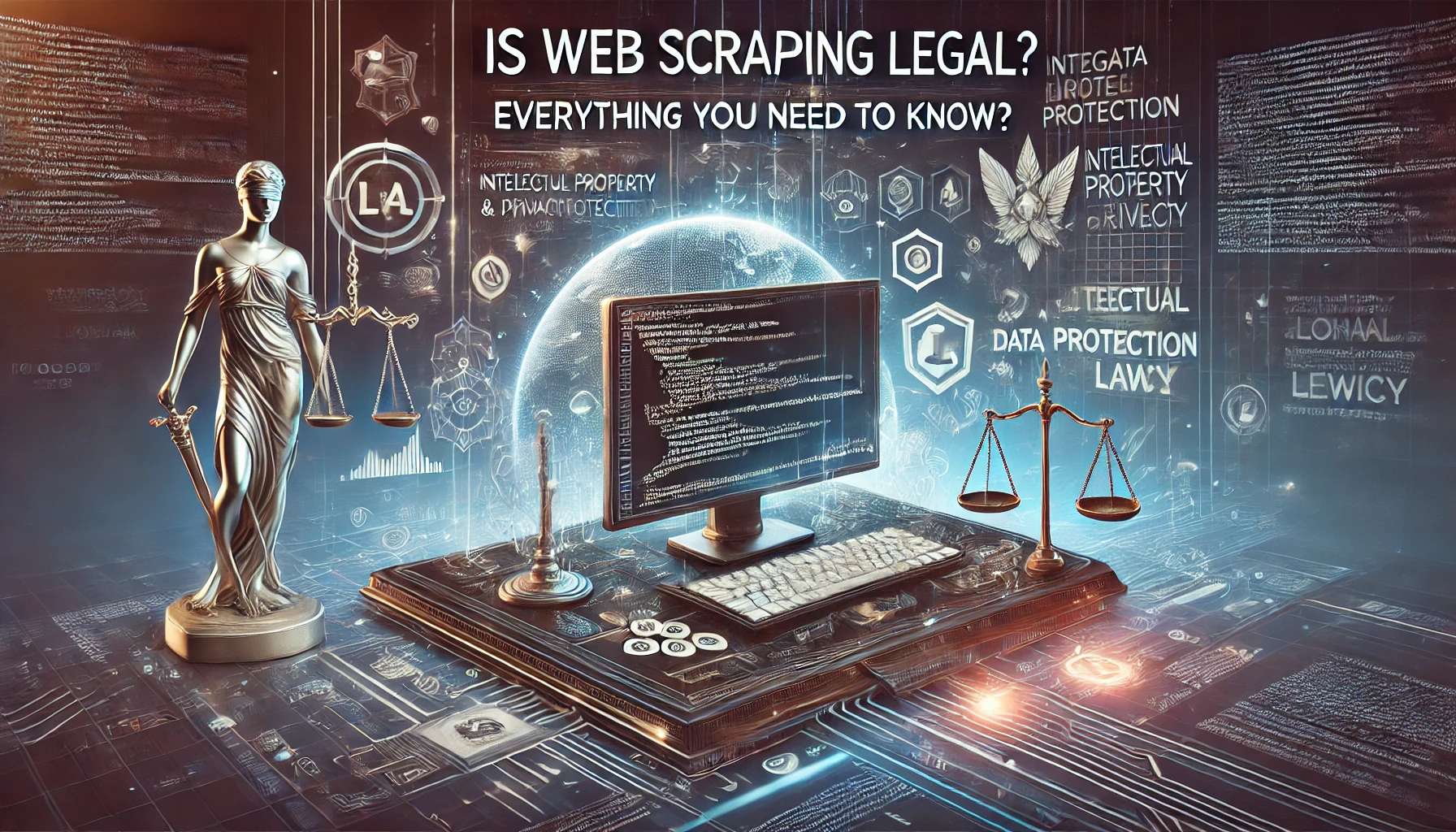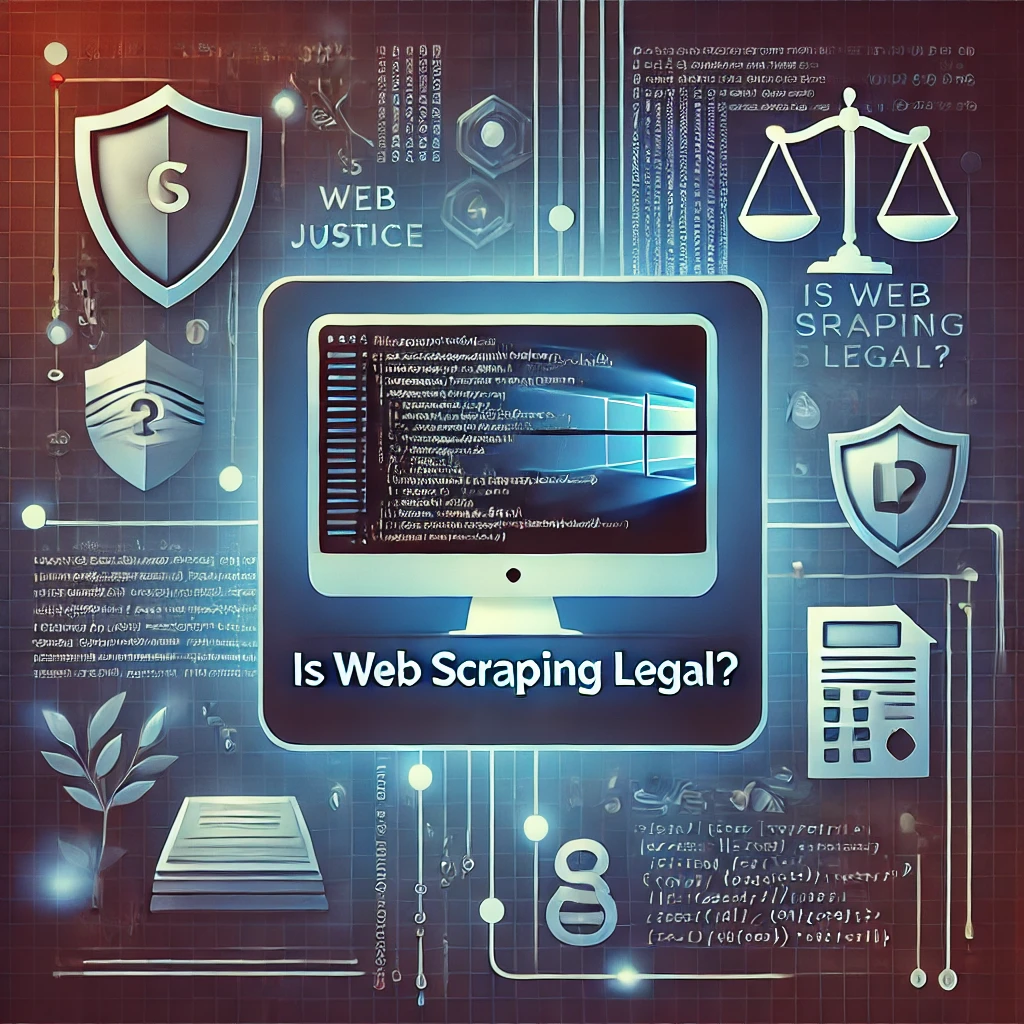
Is Web Scraping Legal?
Is Web Scraping Legal? According to a 2023 analysis by Grand View Research, the global market for web scraping software is anticipated to hit $1.6 billion by 2027, with a compound annual growth rate (CAGR) of 14.1% from 2020 to 2027. As web scraping continues to grow in popularity, so too do its legal challenges. In this blog, we’ll delve into the evolving legal landscape of web scraping, offering the latest insights and practical advice to help you navigate this complex field.
Web scraping, the process of extracting data from websites using automated tools or scripts, has become an essential tool for businesses, researchers, and developers. It allows users to gather large amounts of data quickly and efficiently, often from publicly available sources. However, the legality of web scraping is a topic that often raises concerns. In this blog, we’ll explore the legal aspects of web scraping, discuss its implications, and provide guidance on navigating this complex issue.
Understanding Web Scraping
Web scraping involves using software to extract information from websites. This can include anything from product prices, reviews, and ratings to entire articles or datasets. The data collected can then be analyzed, stored, or used for various purposes, such as market research, competitive analysis, or content aggregation.
The Legal Landscape of Web Scraping
The legality of web scraping is not black and white; it largely depends on the following factors:
1. Terms of Service (ToS) Violations:
- Most websites have Terms of Service agreements that users must agree to when accessing their content. These agreements often include clauses that prohibit automated scraping. Violating these terms can lead to legal action, such as lawsuits or bans from the website.
- Example: LinkedIn has successfully sued companies for scraping user data, arguing that it violated their Terms of Service.
2. Intellectual Property Rights:
- Web scraping can sometimes infringe on intellectual property rights, such as copyrights or trademarks. For example, scraping and republishing copyrighted content without permission can lead to legal consequences.
- Example: News organizations have taken legal action against aggregators that scrape and republish their content without authorization.
3. Data Privacy Laws:
- The collection of personal data through web scraping can also raise issues related to data privacy laws, such as the General Data Protection Regulation (GDPR) in the European Union or the California Consumer Privacy Act (CCPA). These laws impose strict regulations on the collection, use, and storage of personal data.
- Example: Scraping personal information, such as email addresses or social media profiles, without consent can lead to violations of data privacy laws.
4. Publicly Available Information:
- Scraping data that is publicly available on the internet is generally considered less problematic. However, just because data is publicly accessible does not necessarily mean it is legal to scrape it.
- Example: Courts have ruled that scraping publicly accessible information is permissible under certain circumstances, but it depends on the specific use case and jurisdiction.
5. Anti-Scraping Technologies:
- Websites often use anti-scraping technologies, such as CAPTCHAs, IP blocking, or rate limiting, to prevent automated scraping. Attempting to bypass these measures can lead to legal trouble.
- Example: Some courts have considered bypassing anti-scraping technologies as a violation of the Computer Fraud and Abuse Act (CFAA).
Key Court Cases on Web Scraping
Several court cases have shaped the legal landscape of web scraping:
HiQ Labs v. LinkedIn:
In this case, LinkedIn sued HiQ Labs for scraping user data. The court ruled in favor of HiQ, stating that scraping publicly accessible information does not violate the CFAA. However, the case is ongoing and has set an important precedent.
Facebook v. Power Ventures:
Facebook sued Power Ventures for scraping user data without permission. The court ruled in favor of Facebook, stating that Power Ventures violated the CFAA by bypassing Facebook’s security measures.
Best Practices for Legal Web Scraping
To minimize legal risks associated with web scraping, consider the following best practices:
1. Review and Comply with ToS:
Always review the Terms of Service of the website you intend to scrape. If scraping is prohibited, avoid doing so or seek permission from the website owner.
2. Avoid Scraping Personal Data:
Be cautious when scraping personal data, especially in regions with strict data privacy laws. Anonymize or aggregate data whenever possible to reduce privacy concerns.
3. Respect Anti-Scraping Measures:
Do not attempt to bypass anti-scraping technologies, as this can lead to legal action. Instead, consider reaching out to the website owner for an API or data access permission.
4. Use Public APIs:
Many websites offer public APIs that provide access to their data in a legal and structured manner. Using APIs is a safer and more reliable alternative to web scraping.
5. Consult Legal Counsel:
If you’re unsure about the legality of your web scraping activities, consult with legal counsel to ensure compliance with relevant laws and regulations.
Why Choose Invortech for Web Scraping Solutions?
When it comes to web scraping, Invortech stands out as a leader in the field. Here’s why:
Expertise in Data Extraction:
Invortech has extensive experience in developing custom web scraping solutions that are both efficient and compliant with legal standards. We understand the complexities of the legal landscape and work to ensure that your scraping activities are safe and lawful.
Advanced Technology:
We use cutting-edge technology to create robust and reliable web scraping tools that can handle large-scale data extraction while respecting website restrictions and legal requirements.
Compliance and Ethics:
At Invortech, we prioritize compliance with legal and ethical standards. Our team is well-versed in navigating the legal challenges of web scraping, ensuring that our solutions align with your business goals while minimizing risks.
Tailored Solutions:
We offer customized web scraping solutions tailored to your specific needs, whether you require data for market research, competitive analysis, or content aggregation. Our team works closely with you to deliver the results you need.
Conclusion
Web scraping unlocks valuable data but comes with legal risks. Navigating the legal landscape and following best practices is key to staying compliant. At Invortech, we understand the complexities of web scraping and are dedicated to providing high-quality, legally compliant solutions. Let us help you harness data responsibly and stay on the right side of the law.
Tags: #Data Privacy #Is Web Scraping Legal #Legal Challenges of Web Scraping #Web Scraping Ethics #Web Scraping Laws


